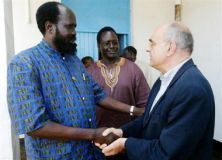UN opens radio in south Sudan, blocked in north
July 1, 2006 (JUBA) — The U.N. mission in Sudan has launched a radio station in the south to educate people about a peace deal that ended years of civil war, but Khartoum has blocked it from broadcasting in the north of the country.
 Run from studios in the southern capital Juba, 101 Miraya/Mirror FM went on air on Friday with a mandate to demystify the complex agreement signed in 2005 to end decades of conflict between south Sudan and the government in Khartoum.
Run from studios in the southern capital Juba, 101 Miraya/Mirror FM went on air on Friday with a mandate to demystify the complex agreement signed in 2005 to end decades of conflict between south Sudan and the government in Khartoum.
But Khartoum has refused to honour a commitment it made last December to let the United Nations broadcast it across the whole country, U.N. officials say.
The head of the U.N. mission in Sudan, Jan Pronk, said he hoped Khartoum would relent so the radio station could spread information about the north-south peace deal and a separate agreement for the conflict in Darfur in the west.
“From a political point of view it’s a missed opportunity to go another step on the road towards democracy,” Pronk said, referring to Khartoum’s refusal to allow the radio in the north.
“I really hope that while listening to Radio Miraya they will learn they do not have to be afraid of such a radio station,” he told a joint news conference with the south’s president, Salva Kiir, after the launching ceremony in Juba.
The government of Sudanese President Omar Hassan al-Bashir has presided over one of the world’s most repressive media environments since it seized power in a coup in 1989, routinely censoring newspapers and jailing journalists.
Khartoum’s refusal to grant the United Nations permission to broadcast in the north reflects wider tensions between the world body and the government, which has refused to allow the deployment of U.N. troops in the troubled Darfur region.
The regional government in south Sudan has in contrast welcomed the radio station and its mission. “It will also play a crucial role for democracy, human rights and fighting against corruption and other vices,” Kiir told the launch ceremony.
The radio station will initially be broadcast mainly in the Juba area on 101 MHz FM, but it aims to build relay stations to reach most of southern Sudan’s roughly eight million people within the next nine months.
(Reuters)
